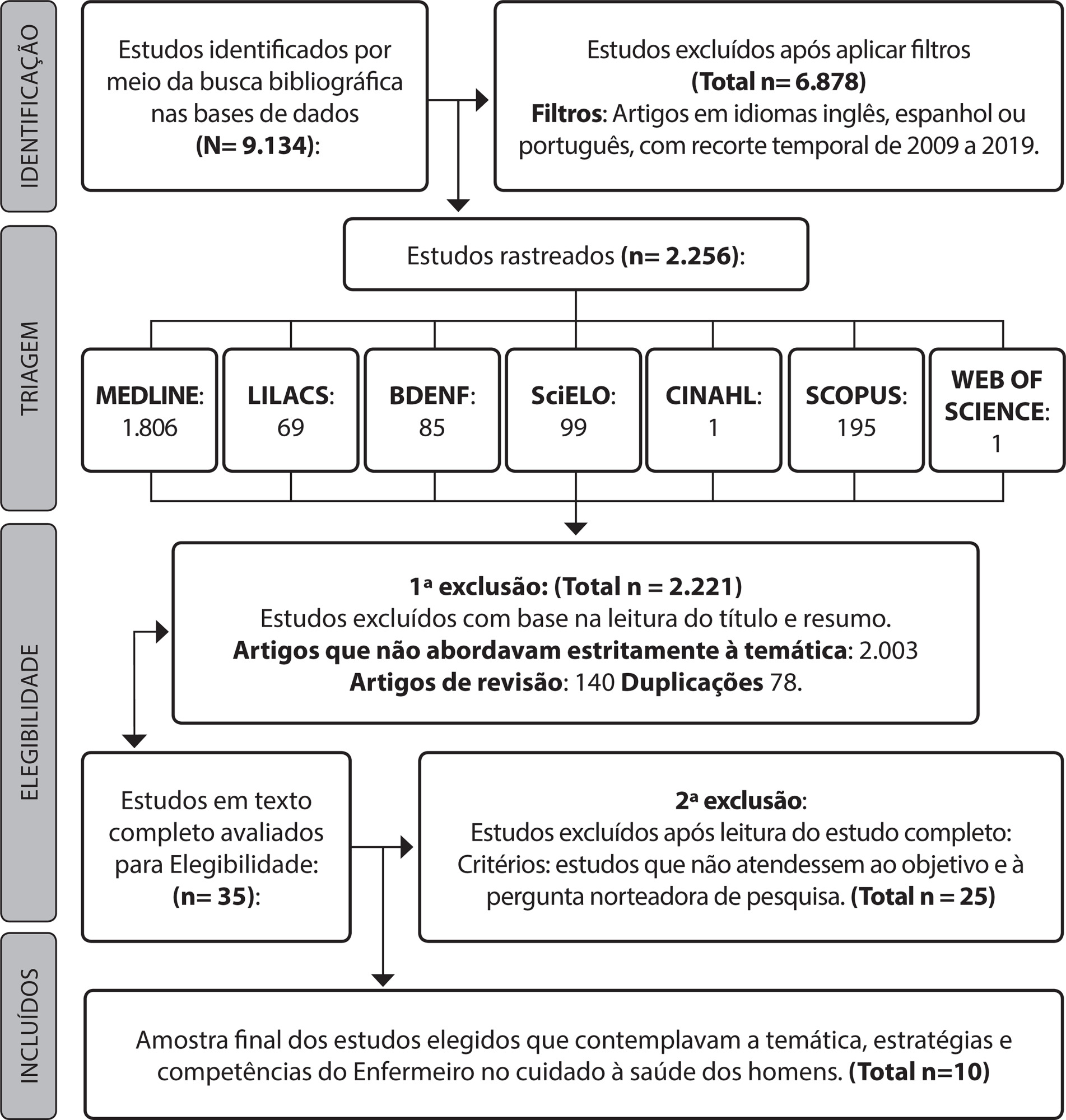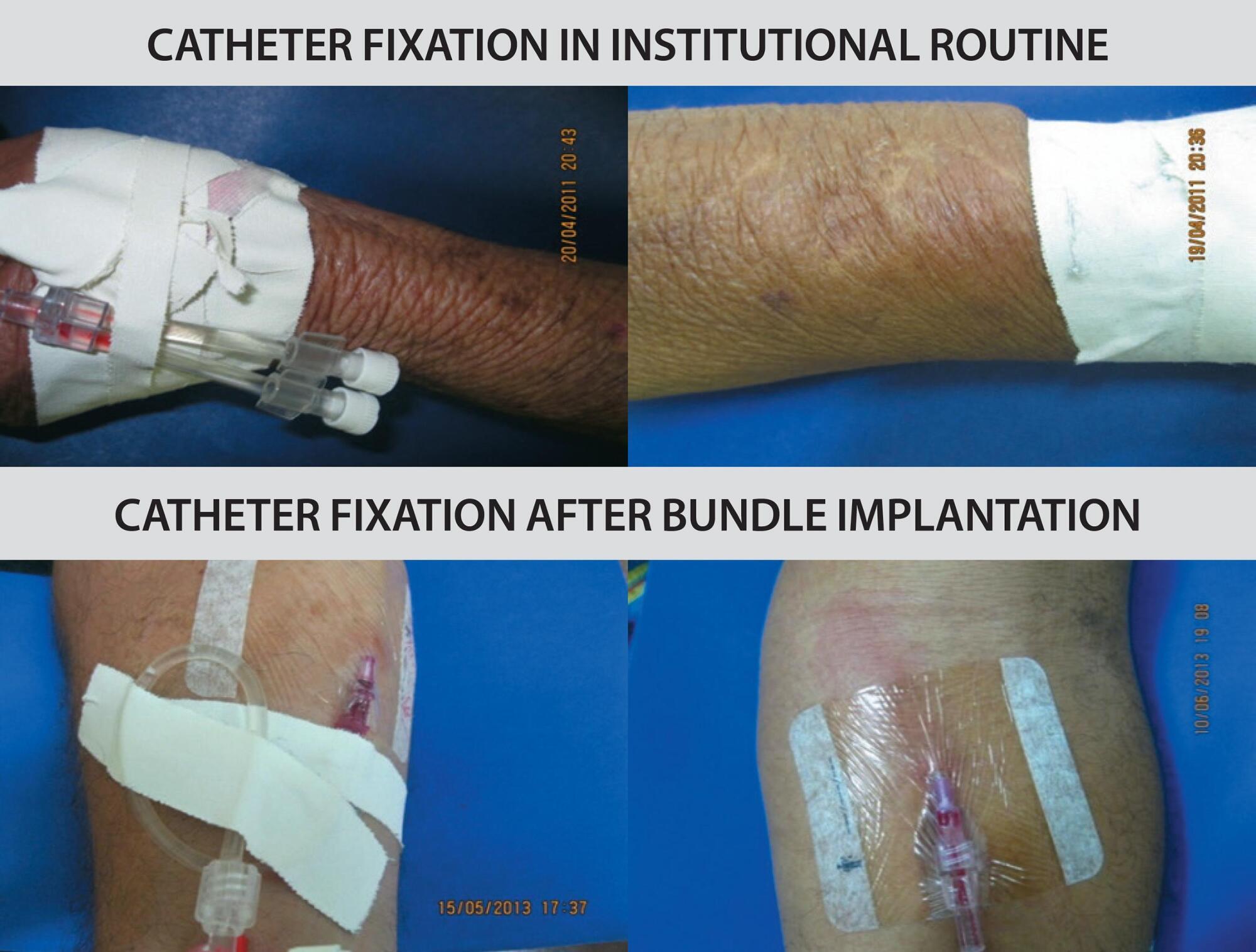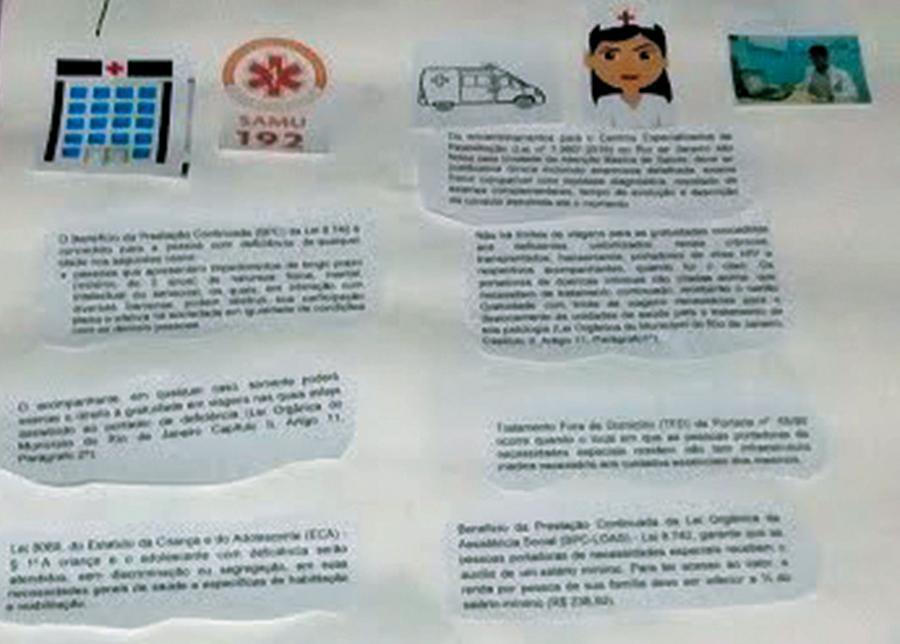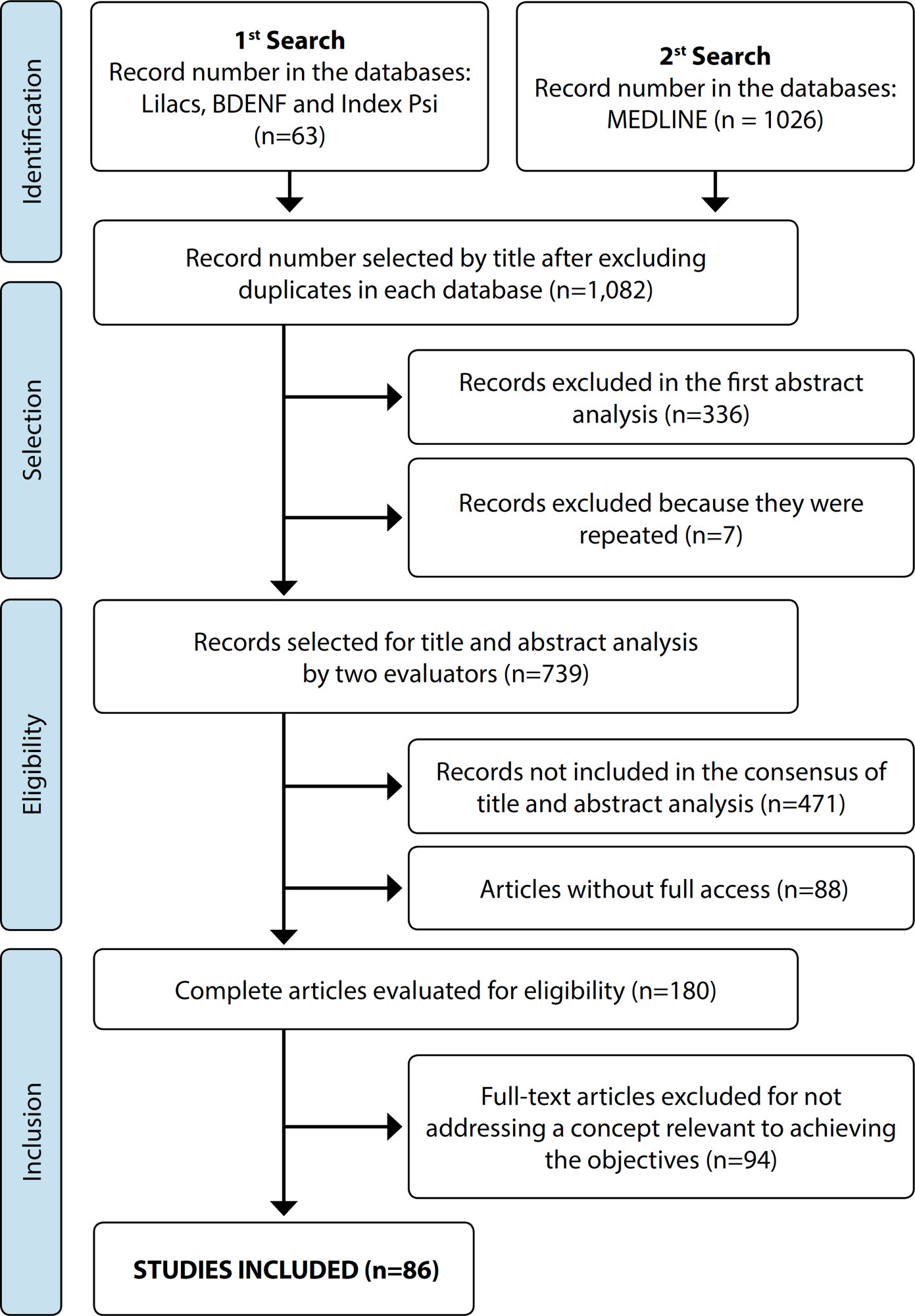-
ARTÍCULO ORIGINAL16/12/2024
Editorial discourses in the history of Acta Paulista de Enfermagem (1988-2017)
Revista Brasileira de Enfermagem. 2024;77(6):e20230362
Resumen
ARTÍCULO ORIGINALEditorial discourses in the history of Acta Paulista de Enfermagem (1988-2017)
Revista Brasileira de Enfermagem. 2024;77(6):e20230362
DOI 10.1590/0034-7167-2023-0362
Visualizações0Ver maisABSTRACT
Objectives:
to analyze the editorial discourses of Acta Paulista de Enfermagem from 1988 to 2017.
Methods:
qualitative, historical, oral research, with interviews with the journal’s editors. Statements were categorized and presented in three decades, discussed from Foucault’s archaeological perspective.
Results:
seven statements presented three discourses. In the first decade, the discourse of knowledge registration and circulation presented statements of graduate studies and professional recognition. In the second decade, knowledge internationalization was added, with statements of business and editorial panopticism, selection criteria, indexing and digitalization. Finally, the discourse of shifting scientific assessment centrality was added with statements of preprint, open science, exclusive digitalization and mediatization of science.
Final Considerations:
the journal needed to adapt to form its official discourse, which made it possible, over the years, to change its initial peripheral position to a central one within scientific communication, supporting its panoptic role.
-
ARTÍCULO DE REVISIÓN16/12/2024
Strategies for expanding vaccination coverage in children in Brazil: systematic literature review
Revista Brasileira de Enfermagem. 2024;77(6):e20230343
Resumen
ARTÍCULO DE REVISIÓNStrategies for expanding vaccination coverage in children in Brazil: systematic literature review
Revista Brasileira de Enfermagem. 2024;77(6):e20230343
DOI 10.1590/0034-7167-2023-0343
Visualizações1Ver maisABSTRACT
Objectives:
to identify the strategies found in the literature for increasing vaccination coverage among children in Brazil. It is justified mainly by the current scenario of falling vaccination coverage.
Methods:
systematic literature review. The search was carried out in the Pubmed (MEDLINE), Embase and Scopus databases, following the PRISMA guidelines.
Results:
initially, 4,824 results were returned. In the end, 6 studies were included for narrative synthesis using the SWiM methodology. Of these, 50% dealt with studies related to the Bolsa Família Program (PBF). The others explored strategies for approaching parents directly, Rapid Vaccination Monitoring (MRV) and the Community Health Agents Program (PACS). The PBF did not guarantee compliance with the conditionality of keeping vaccinations up to date. The MRV and PACS are effective strategies, especially because they allow active search for absentees.
Conclusions:
we conclude that more publications are needed on strategies to increase vaccination coverage among children in Brazil.

-
ARTÍCULO ORIGINAL16/12/2024
Educational technology to empower patients as participants in their care
Revista Brasileira de Enfermagem. 2024;77(6):e20230359
Resumen
ARTÍCULO ORIGINALEducational technology to empower patients as participants in their care
Revista Brasileira de Enfermagem. 2024;77(6):e20230359
DOI 10.1590/0034-7167-2023-0359
Visualizações0Ver maisABSTRACT
Objectives:
to build and validate an educational technology to empower patients as participants in their own care.
Methods:
methodological study to develop an educational technology based on the elaboration, validation, and evaluation that were carried out in five stages at a teaching hospital in Amazonas. The study was carried out from 2019 to 2022, with the participation of 19 judges specialized in patient safety and 72 patients admitted to the hospital’s medical and surgical clinics, the study setting.
Results:
the agreement between the judges obtained an overall index of 0.85, being considered validated. The overall analysis of the booklet obtained an assessment of the level of agreement above 85%.
Final Considerations:
the educational technology presented here was validated and suitable for promoting patient/professional rapprochement and consolidating health care in a way that increases the patient’s ability to contribute to their treatment and prevent the occurrence of adverse events.

-
ARTÍCULO ORIGINAL13/12/2024
Educational booklet on labor and delivery: validity study
Revista Brasileira de Enfermagem. 2024;77(5):e20240138
Resumen
ARTÍCULO ORIGINALEducational booklet on labor and delivery: validity study
Revista Brasileira de Enfermagem. 2024;77(5):e20240138
DOI 10.1590/0034-7167-2024-0138
Visualizações2Ver maisABSTRACT
Objectives:
to develop and validate an educational booklet on labor and delivery for pregnant women.
Methods:
this methodological study involved constructing and validating a booklet based on Echer’s framework. We used the Content Validity Index and Cronbach’s alpha for content and face validation, selecting judges according to Fering’s criteria. We then conducted a clinical validation with the target population.
Results:
the booklet, developed based on evidence from an integrative review and validated by judges and the target audience, achieved global Content Validity Index of 0.919 and 0.913, respectively. After clinical validation with 22 pregnant women, it included 28 topics and 48 pages, with illustrations by a graphic designer.
Conclusions:
expert judges and the target audience considered this educational technology valid, deeming it a relevant tool for promoting the health of pregnant women.

-
ARTÍCULO ORIGINAL13/12/2024
Interobserver agreement in Reception and Risk Stratification in Obstetrics implementation
Revista Brasileira de Enfermagem. 2024;77(5):e20230361
Resumen
ARTÍCULO ORIGINALInterobserver agreement in Reception and Risk Stratification in Obstetrics implementation
Revista Brasileira de Enfermagem. 2024;77(5):e20230361
DOI 10.1590/0034-7167-2023-0361
Visualizações0Ver maisABSTRACT
Objectives:
to analyze interobserver agreement in the Reception and Risk Stratification in Obstetrics protocol implementation.
Methods:
a cross-sectional study carried out during Reception and Risk Stratification in Obstetrics implementation, conducted in a tertiary hospital in southern Brazil with 891 participants in January 2020. Descriptive and interobserver agreement analysis was carried out using the Kappa coefficient in the risk stratification assigned by the triage nurse and reviewed by the researcher.
Results:
around half of the calls (55.6%) were stratified as not very urgent (green), followed by urgent (yellow) (31.8%), very urgent (orange) (9.3%), not urgent (blue) (3.4%) and no emerging stratification (red). Agreement analysis of revised stratification found Kappa values of 0.20 (blue), 0.54 (green), 0.77 (yellow) and 0.80 (orange).
Conclusions:
most appointments were non-urgent. The agreement analysis between the revised and assigned risk stratification revealed greater interobserver agreement as the priority level increased.
-
13/12/2024
Training of Brazilian indigenous nurses: between human rights, valuing diversity and inclusion
Revista Brasileira de Enfermagem. 2024;77(5):e20230430
Resumen
Training of Brazilian indigenous nurses: between human rights, valuing diversity and inclusion
Revista Brasileira de Enfermagem. 2024;77(5):e20230430
DOI 10.1590/0034-7167-2023-0430
Visualizações0Ver maisABSTRACT
Objectives:
to analyze the possibilities and potential of training indigenous nurses, given the Brazilian Health System (SUS), understanding the relationships between education and health.
Methods:
theoretical-reflective study, based on scientific literature, aligned with the experience, critical thinking of its authors and the Sustainable Development Goals in Brazil.
Results:
this text articulates three axes: Potential for including indigenous students in nursing training; Paths to achieving equity through inclusion and retention policies for indigenous students at different levels; and Implications of this for the SUS and global health.
Final Considerations:
indigenous students, beneficiaries of affirmative actions, face challenges of inclusion and retention in public universities that directly impact their academic training. Added to this are the difficulties identified in basic education, professor training and implementation of permanence policies, with consequences for services and training at other levels.
-
ARTÍCULO ORIGINAL13/12/2024
Stress in nursing workers caring for people with COVID-19
Revista Brasileira de Enfermagem. 2024;77(5):e20230542
Resumen
ARTÍCULO ORIGINALStress in nursing workers caring for people with COVID-19
Revista Brasileira de Enfermagem. 2024;77(5):e20230542
DOI 10.1590/0034-7167-2023-0542
Visualizações1Ver maisABSTRACT
Objectives:
to analyze stress from the perspective of nursing workers caring for people with COVID-19 in a public hospital in the Recôncavo region of Bahia.
Methods:
this is an exploratory qualitative study, conducted through semi-structured interviews. The data were analyzed using word clouds, similarity trees, and content analysis.
Results:
nursing workers were exposed to stress while attending to patients with COVID-19. The reported stressors in the workplace included: work overload, lack of planning, speed in performing tasks, fatigue, lack of participation in decision-making, lack of support from management, technological changes, excessive responsibility without preparation, interpersonal conflicts, and professional undervaluation.
Conclusions:
exposure to these stressors leads to emotional exhaustion and demotivation, which were intensified during the COVID-19 pandemic.

-
ARTÍCULO ORIGINAL13/12/2024
Adaptation and implementation of a Nursing care protocol for children in the Amazon Region
Revista Brasileira de Enfermagem. 2024;77(5):e20230245
Resumen
ARTÍCULO ORIGINALAdaptation and implementation of a Nursing care protocol for children in the Amazon Region
Revista Brasileira de Enfermagem. 2024;77(5):e20230245
DOI 10.1590/0034-7167-2023-0245
Visualizações0Ver maisABSTRACT
Objectives:
to describe the process of implementing an adapted protocol for pediatric nursing care in a health unit located in a municipality in the Amazon Region.
Methods:
methodological research conducted in a basic health unit with four family health teams in the state of Rondônia, involving seven nursing professionals. Data collection occurred between October 2020 and April 2022, following the research phases: situational diagnosis, exploratory phase, protocol definition, implementation, and evaluation.
Results:
the outcome was the adaptation and implementation of a nursing care protocol for children.
Final Considerations:
the adaptation and implementation process can be an effective approach to improving care, strengthening nursing as a profession with a solid foundation in scientific and clinical evidence. This facilitates early problem identification and appropriate guidance, leading to better health outcomes for children.
-
ARTÍCULO DE REVISIÓN21/12/2020
Estratégias e competências do enfermeiro no cuidado à saúde dos homens: revisão integrativa
Revista Brasileira de Enfermagem. 2020;73:e20190546
Resumen
ARTÍCULO DE REVISIÓNEstratégias e competências do enfermeiro no cuidado à saúde dos homens: revisão integrativa
Revista Brasileira de Enfermagem. 2020;73:e20190546
DOI 10.1590/0034-7167-2019-0546
Visualizações0Ver maisRESUMO
Objetivos:
sumarizar as evidências científicas sobre as estratégias e competências de enfermeiros no cuidado à saúde dos homens.
Métodos:
revisão integrativa, realizada em sete bases de dados, com recorte temporal de 2009 a 2019, utilizando os descritores “saúde do homem”, “competência profissional”, “enfermagem”, “cuidados de enfermagem” e “masculino” em português e em inglês.
Resultados:
selecionaram-se dez produções, nas quais demonstrou-se que profissionais de enfermagem desenvolvem suas práticas profissionais no que se refere ao cuidado à saúde dos homens, em convergência com as competências gerais da profissão, sendo as mais utilizadas: atenção à saúde; tomada de decisões; comunicação; administração; gerenciamento; Educação Permanente e liderança, consecutivamente.
Considerações Finais:
revelou-se o empenho dos profissionais para o fortalecimento das ações em saúde, direcionadas às necessidades masculinas, em conformidade com as competências gerais da profissão e os princípios e diretrizes da Política Nacional de Atenção Integral à Saúde do Homem.

-
ARTÍCULO ORIGINAL21/10/2019
Nursing protocol in vascular trauma prevention: peripheral catheterization bundle in urgency
Revista Brasileira de Enfermagem. 2019;72(6):1512-1518
Resumen
ARTÍCULO ORIGINALNursing protocol in vascular trauma prevention: peripheral catheterization bundle in urgency
Revista Brasileira de Enfermagem. 2019;72(6):1512-1518
DOI 10.1590/0034-7167-2018-0457
Visualizações0Ver maisABSTRACT
Objective:
to create, apply and analyze in clinical practice the effectiveness of a bundle to prevent peripheral vascular trauma to approach the peripheral venous puncture process.
Method:
action research with 435 adult participants in an emergency service from 2011 to 2013. Creation of the bundle for prevention of vascular trauma based on scientific evidence, ease of operation, observation and measurement with implantation through an educational intervention of the team of nursing. Effectiveness analyzed by descriptive and inferential statistics using chi-square. Consecutive sample with 95% confidence interval.
Results:
Five stages of the bundle were related to the catheter fixation, permanence and removal process. The incidence of vascular traumas due to vein punctures reduced by 46.41% after implantation of the bundle to prevent vascular trauma associated with emergency peripheral catheterization.
Conclusion:
The bundle in clinical practice reduced vascular traumas by venipuncture.

-
ARTÍCULO ORIGINAL31/07/2020
Demandas educativas de familiares de crianças com necessidades especiais de saúde na transição hospital casa
Revista Brasileira de Enfermagem. 2020;73:e20190156
Resumen
ARTÍCULO ORIGINALDemandas educativas de familiares de crianças com necessidades especiais de saúde na transição hospital casa
Revista Brasileira de Enfermagem. 2020;73:e20190156
DOI 10.1590/0034-7167-2019-0156
Visualizações0RESUMO
Objetivos:
analisar as demandas educativas dos familiares de crianças com necessidades especiais de saúde na transição do hospital para casa.
Métodos:
pesquisa qualitativa realizada entre fevereiro e junho de 2018, por meio, de dinâmicas de criatividade e sensibilidade do Almanaque do método criativo sensível; participaram nove cuidadores familiares de crianças, internadas em um hospital público do Rio de Janeiro, cujos dados foram submetidos a análise de discurso francesa.
Resultados:
as demandas educativas foram de origem clínica centrada nos cuidados complexo e contínuo, tecnológico, habitual modificado, medicamentoso, de desenvolvimento, misto e de origem social, relacionada aos insumos e direitos das crianças.
Considerações Finais:
a demanda educativa social emergiu como uma nova tipologia a ser incorporada ao conjunto de cuidados dessas crianças. A transição do hospital para casa deve ser processual, tendo o enfermeiro como coordenador, visando um cuidado participativo, seguro, com qualidade e articulado dentro de uma rede social.
Palavras-chave: Cuidado TransicionalEducação em SaúdeFamíliaNecessidades e Demandas de Serviços de SaúdeSaúde da CriançaVer mais
-
INFORME DE EXPERIENCIA13/11/2020
Pedagogical mediations for non-formal nursing teaching during the COVID-19 pandemic
Revista Brasileira de Enfermagem. 2020;73:e20200499
Resumen
INFORME DE EXPERIENCIAPedagogical mediations for non-formal nursing teaching during the COVID-19 pandemic
Revista Brasileira de Enfermagem. 2020;73:e20200499
DOI 10.1590/0034-7167-2020-0499
Visualizações0Ver maisABSTRACT
Objective:
to report the experience of developing pedagogical mediations in a Virtual Learning Environment implemented in a nursing faculty during the COVID-19 pandemic.
Methods:
an experience report on the construction of a distance course aimed at graduates and residents of a nursing faculty at a public university located in the city of Rio de Janeiro.
Results:
the course’s conception, operationalization and implementation were the result of a collective work that culminated in a non-formal, virtual and problematic teaching process, which reached a participation rate of 82% of enrolled students.
Final considerations:
even in times of social isolation, the course promoted collaborative learning of knowledge about COVID-19 and strengthened the relationship between professors and students. The possibility of carrying out distance activities based on solid methodological proposals that contradict the content logic often observed in distance learning is emphasized.

-
INFORME DE EXPERIENCIA05/02/2021
Paulo Freire’s culture circles: contributions to nursing research, teaching, and professional practice
Revista Brasileira de Enfermagem. 2021;74(1):e20190626
Resumen
INFORME DE EXPERIENCIAPaulo Freire’s culture circles: contributions to nursing research, teaching, and professional practice
Revista Brasileira de Enfermagem. 2021;74(1):e20190626
DOI 10.1590/0034-7167-2019-0626
Visualizações0Ver maisABSTRACT
Objectives:
to share the contributions of culture circles for teaching, research, and professional nursing practice, having as framework Paulo Freire’s Research Itinerary.
Methods:
this is an experience report of a culture circle, with participation of three professors and ten students, enrolled in a course of a Graduate Program in Nursing in southern Brazil. In this culture circle, a tree was built in which the roots formed the thematic investigation, the stem, coding and decoding, and the leaves, the Research Itinerary critical unveiling.
Results:
participants demonstrated empowerment of Paulo Freire’s assumptions, and building a tree made it possible to discuss in a pleasant and playful way culture circle use in teaching, research, and professional nursing practice.
Final Considerations:
the culture circle promoted reflection and action on nursing praxis, turning Freirean thoughts into something concrete and transforming realities.

-
ARTÍCULO DE REVISIÓN28/05/2021
Scientific production about palliative care and communication in online journals: a scoping review
Revista Brasileira de Enfermagem. 2021;74(2):e20190378
Resumen
ARTÍCULO DE REVISIÓNScientific production about palliative care and communication in online journals: a scoping review
Revista Brasileira de Enfermagem. 2021;74(2):e20190378
DOI 10.1590/0034-7167-2019-0378
Visualizações0Ver maisABSTRACT
Objectives:
to characterize publications about palliative care and communication, with an emphasis on the approaches addressed, disseminated in online journals.
Methods:
it is a scope review, in which the mnemonic strategy Problem, Concept and Context was used, based on database research. The sample consisted of 86 publications.
Results:
most publications were written in the English language, published in the journal BMC Palliative Care, and with level of evidence IV. As for the approaches approached, the following stand out: Importance of communication in palliative care; Breaking the bad news in palliative care; Training professionals/staff to communicate in palliative care; and Communication strategies in palliative care.
Final Considerations:
the review made it possible to map a significant number of publications on palliative care and communication. It is recommended to produce new studies with better scientific evidence that guide the assistance of health professionals.

-
ARTÍCULO ORIGINAL10/02/2020
Group Brief Intervention: effectiveness in motivation to change alcohol intake
Revista Brasileira de Enfermagem. 2020;73(1):e20180138
Resumen
ARTÍCULO ORIGINALGroup Brief Intervention: effectiveness in motivation to change alcohol intake
Revista Brasileira de Enfermagem. 2020;73(1):e20180138
DOI 10.1590/0034-7167-2018-0138
Visualizações0Ver maisABSTRACT
Objective:
To verify the effectiveness of the group brief intervention (GBI), performed by nurses in motivational stages to change the pattern of alcohol intake.
Method:
Randomized controlled trial with 3-month follow-up. The ruler of readiness for change was applied in 180 individuals with risk or harmful alcohol intake pattern in basic health unit. Only the experimental group (EG) was submitted to the intervention. Both groups (experimental and control [CG]) participated in the follow-up.
Results:
EG had a mean score before GBI=6.55 (SD=3.41) points (preparation). After GBI=8.00 (SD=2.88) points (action) and in the follow-up 7.92 (SD=3.06) points (action). CG presented a mean score before GBI=5.42 (SD=3.26) points (preparation); after GBI=6.67 (SD=3.05) points (preparation) and in the follow up had a mean score of 4.80 (SD=2.86) points (contemplation). There was a statistically significant difference between the two groups at the motivational stages (p≤ 0,03).
Conclusion:
It was evidenced that GBI was effective in increasing the motivation to change harmful alcohol intake.

Búsqueda
Buscar en:
Nuvem de Tags
Adolescente (85) Atenção Primária à Saúde (239) COVID-19 (91) Criança (91) Cuidados de Enfermagem (269) Educação em Enfermagem (151) Educação em Saúde (139) Enfermagem (930) Enfermagem Pediátrica (86) Estudantes de Enfermagem (77) Estudos de Validação (131) Família (87) Idoso (208) Promoção da Saúde (99) Qualidade de Vida (104) Saúde do Trabalhador (86) Saúde Mental (145) Saúde Pública (82) Segurança do Paciente (150) Tecnologia Educacional (100)



